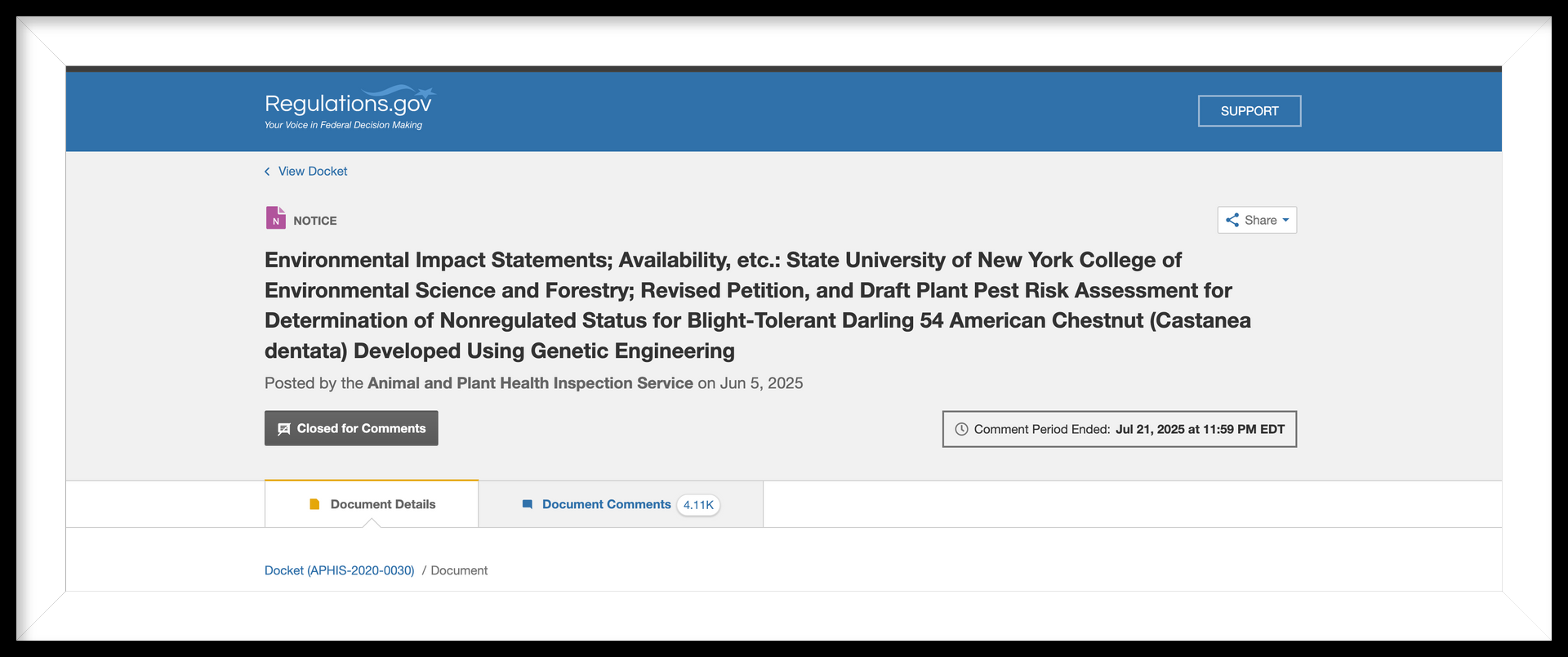Comment Period Ended: Jul 21, 2025 for responding to "advising the public that the Animal and Plant Health Inspection Service has prepared a revised draft environmental impact statement (EIS) and revised draft plant pest risk assessment (PPRA) evaluating the potential environmental impacts and plant pest risk that may result from the approval of a petition for nonregulated status for blight-tolerant American chestnut.
We are advising the public that the Animal and Plant Health Inspection Service has prepared a revised draft environmental impact statement (EIS) and revised draft plant pest risk assessment (PPRA) evaluating the potential environmental impacts and plant pest risk that may result from the approval of a petition for nonregulated status for blight-tolerant American chestnut" -
Here is our posted response: https://www.regulations.gov/comment/APHIS-2020-0030-19931
Submitted on July 21st 2025,
I oppose the petition to grant non-regulated status to the 54 or 58 chestnut. Doing so would set a dangerous precedent for introducing undocumented biotechnology into publicly managed lands under the guise of restoration. This move risks undermining legitimate conservation efforts—especially as recent biotechnology regulatory implementation plans have been developed without sufficient public transparency or awareness.
Recent changes to the National Environmental Policy Act (NEPA) “Phase 2,” which went into effect on July 1, 2024, introduce exceptions for biotechnology through “Categorical Exclusions” (CEs). These new CEs, implemented by APHIS, include the use of “vaccines for animals” and the “development, production, and release of sterile insects” (see attachment: NEPA CEs). Projects covered under these exclusions may move forward without public input, in the name of “science.”
Meanwhile, multiple recent revisions to the Endangered Species Act (ESA) allow developers to proceed without public oversight by applying for Incidental Take Permits (ITPs) through Habitat Conservation Plans (HCPs), as outlined in Sections 7 and 10. These changes include a “no surprises” clause that indemnifies biotechnology developers from liability for unintended consequences—while shielding their identities from public disclosure. Furthermore, developers will be permitted to self-manage their ITP documentation, with limited transparency around the genetic materials involved.
(For a more detailed breakdown of my regulatory concerns, please see my attached May 2, 2025, response to USFWS. My full comment is also available online at: https://www.regulations.gov/comment/FWS-R3-ES-2024-0137-70501 )
This response also references—but does not fully cover—concerns tied to the Public Land Renewable Energy Development Act of 2025 (H.R. 1994, PLREDA) (attached). Under this legislation, 25% of untaxed energy revenue may be directed toward streamlining biotechnology implementation on public lands—decisions like this petition will only accelerate that process.
It's also important to note that USFWS has refused to provide access to the “strategic plan” required by each federal agency under the Government Performance and Results Act of 1993 (GPRA). This lack of transparency only reinforces growing concerns about how biotechnology is being implemented outside of public view.
Take a moment to imagine this new patented species being granted lease agreements from public land managers under the banner of “restoration efforts.” This would create a taxpayer-funded pipeline into unregulated, unaccountable, and undocumented transgenic experiments—administered by NGOs (some international) with no public oversight and no clear accountability. These actions could fundamentally alter the way federal, state, and even private lands (via funded conservation agreements) are managed. More troubling, they would erode the public’s ability to enjoy and protect the lands we all share. To alter the biosphere through genetic engineering without transparency, oversight, or public involvement is more than reckless—it’s a form of corruption that betrays the core principles of environmental stewardship.
The petition should be rejected in favor of a permit-based approach that ensures ongoing oversight throughout the full lifespan of the tree. A documented regulatory history would help build public trust in the variant over time and allow traceability in the event of unintended consequences. True stewardship demands accountability, transparency, and the ability to respond—none of which are possible under non-regulated status.
International trade impacts must also be considered. Countries may choose to reject genetically engineered chestnuts—and could extend those bans to other U.S. nut products. This would create serious economic risks for growers and sellers who have no connection to the GE variant. These trade and policy issues must be discussed openly and publicly before deregulation is granted.
onventional breeding efforts that are already showing promise should be given time to succeed. While I fully support investment in science, it must be done with caution, documentation, and respect for the natural biosphere. Without proper records, we cannot learn from our mistakes. And without that learning, we lose the ability to call this science.
It’s also worth noting that for over 10 years, my efforts to share information about biotechnology regulation have been heavily censored across social media platforms and news outlets. Multiple FOIA requests have failed.
Biotechnology experiments should not move forward under the influence of executive orders or behind closed doors. They must be part of the public conversation.
Just humbly saying,
Josh Wilson
byandforthepeople.org
josh@byandforthepeople.org











